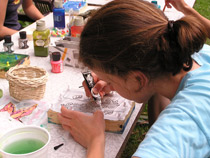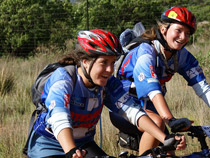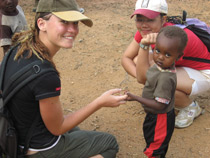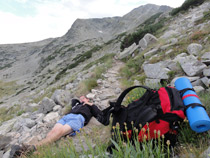The Award participants select activities and set goals in four basic areas of development, in the Gold level they also participate in a residential project.
The aim of this section is to encourage young people to choose an activity within the scope of their society and culture in which they are interested in, in order to develop their skills. The important thing in the skills section is that more importantly than reaching a level of certain talent, the aim is for the young people to set goals and carry out the activity regularly. For the skills section, all participants need a skilled person or teacher to work with in order to develop their abilities.
GAINS:
- Discovering new talents and areas of interest
- Developing social skills
- Meeting new people
- Learning time management
- Learning to face challenges
- Gaining confidence and motivation
- Creating new career goals
Some examples of Skills activities…
- Music: Learning an instrument, vocal lessons, taking part in a musical Theatre
- Coaching and referee training
- Hand crafts: Ceramics, clay, decoration, couture, glass painting, jewellery making, fine art drawing, sketching, art history, photography, graphic design…
- Nature and Environment: Agriculture, astronomy, bee keeping, dog training, fishing, forestry, gardening, horse maintenance, and meteorology…
- Communication: Video recording and film production, sign language, foreign languages, preparing news articles and magazines, presentation skills, debating techniques, digital media, information technology, web-site management…
- Games: Snooker, card games, chess, check, darts, backgammon…
The Physical Recreation section aims to increase body health, team-work skills, self-respect and confidence.
Gains:
- Increasing physical capacity
- Discovering new talents and areas of interest
- Learning to deal with challenges
- Taste the feeling of success
- Confidence
- Team-work
- Self-discipline
Some examples from Physical Recreation activities… - In this section, the participants can either start a completely new activity or can develop their skills in an activity they already take part in.
- Athleticism Activities: Athleticism, gymnastics, fitness, orienteering, running, high jump…
- Dance: Ballet, modern dance, ballroom dancing, Latin dancing, folklore…
- Far-eastern Sports: Aikido, judo, karate, kendo…
- Racket sports: Badminton, tennis, squash, and table tennis…
- Team Games: Basketball, football, volleyball, hockey, handball
- Water Sports: Swimming, diving, canoeing, surfing, water polo, water skiing…
- Archery, bowling, cave exploration, biking, fencing, golf, riding, climbing, skating, weight lifting, wrestling, yoga etc.
The Voluntary Service section aims to stress the importance of volunteering and taking part in social service by showing young people that individuals within a society need one another. In this section, participants need to find an activity that will help serve their community whilst developing their own personal skill set. There are plenty of options for the service section; it can be carried out individually or under the supervision of an organisation.
Gains:
- Personal Development
- People management skills and leadership skills
- Understanding different cultures
- Awareness of other societies
- Trust
- Awareness of strengths and weaknesses
- Confidence
- Getting rid of prejudices
- Development of a sense of responsibility
- Social and personal happiness
Gönüllü Hizmet Faaliyetlerine bazı örnekler
The activities that can be carried out are plentiful. The Award Leader should encourage the participant to undertake some research. There are a few detailed examples below.
- Helping elderly or disabled people with their shopping, gardening or house work
- Volunteering at a hospital or old people’s home
- Helping out with a local radio, newspapers or blogs
- Becoming a sports coach or leader
- Joining first aid courses and using these newly attained skills to help the community
- (For example being a first aid assistant at football matches)
- Helping with the education of primary school children
- Working with experienced people to train people on important issues such as basic health services, vaccination campaigns.
- Taking part in environmental projects such as cleaning land, rivers and seas or protecting endangered animals or trees.
The Adventurous Journey section aims to increase self-confidence in young people through teamwork, help develop a spirit of adventure, gain environmental awareness and respect nature. The Adventurous Journey section allows participants to gain experience regarding teamwork and nature through spending time in a team within an environment they are not too familiar with previously chosen objectives. In this section, participants take part in training and plan their camping activities beforehand. Completing the camp requires confidence, determination and planned teamwork. Each participant takes part in a camp according to his or her category.
Bronze Category: The camp period lasts for at least 1 night and 2 days.
Silver Category: The camp period lasts for at least 2 nights and 3 days.
Gold Category: The camp period lasts for at least 3 nights and 4 days.
Before taking part in the camp, all participants must take part in the necessary training and activities in order to be prepared. Training must include theoretical and practical training, and topics not limited to security measures, navigation and environmental awareness. The participants must prepare a report at the end of their camp. The report may include visuals. As security and safety is the most important issue when it comes to this section, responsible adults (Award Leaders, Supervisors & Assessors) audit each and every camp. Adults that have not undertaken this training cannot be considered a part of the team. If there are such people within the team, they need to stick to all rules that have been determined by the team.
GAINS:
- Developing planning skills
- Entrepreneurship
- Teamwork
- Learning to face challenges and taking responsibility
- Confidence
- Developing leadership skills
- Taking initiative
- Understanding nature
This section, which only needs to be completed within the Gold Category, aims for young people to take part in an activity for the common good with a team that they have not worked with before; this allows young people to develop their sense of responsibility and spirit of team work.
Necessary Conditions:
The participants must stay in an environment that they are not used to with people they do not know for at least 4 nights and 5 days to work towards a common goal. If the activity is the same and the nights stayed are at least 4, it is possible to complete the Residential Project over two weekends.
GAINS:
- Meeting new people
- Entrepreneurship
- Teamwork
- Learning to face challenges and taking responsibility
- Confidence
- Developing leadership and communication skills
- Understanding different cultures
- Trust
- Awareness of strengths and weaknesses
- Getting rid of prejudices
- Developing a sense of responsibility
A few examples for the Residential project…
Residential Projects take the form of camps, lessons or projects. There are a few examples below:
Volunteer work with centres that aim to protect nature and the environment
Sport activity training
Youth camps
Youth parliaments
Restoration of parks and buildings
Voluntary projects that aim to help disabled, at risk and marginalised or elderly people in hospitals, old people’s homes or centres.
Residential Projects should ideally be aimed towards a common good whilst at the same time sparking the interest of the participant. The project can be related to any other section of the Award other than the Adventurous Journey section.










